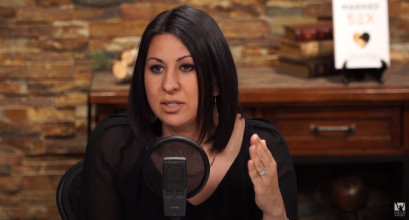Sponsor ID: This program is sponsored by Focus on the Family, a listener-supported ministry helping families thrive in Christ.
John Fuller: Today on Focus on the Family, we’ll be addressing a significant issue impacting every marriage, physical intimacy. And this is going to be a very frank, godly discussion for husbands and wives. And we do recommend you direct the attention of younger listeners elsewhere. And let’s start off with an observation from author and speaker, Gary Thomas.
Preview:
Gary Thomas: Vastly, more important than anything I might ever write about sex is it seems almost ridiculous to say this is what God has written about sex. And so often we don’t understand the way that God speaks of sex in such high terms and with such celebration. In fact, one thing alone says so much a-about how God views sex, ’cause prayer is really important in the Christian life. But there isn’t a single book in the Bible devoted exclusively to prayer. Finances are all over scripture, there isn’t a single book in the Bible devoted exclusively to how we handle our finances. When you think about it, there’s really one book that has one central focus. And guess what book is? The Song of Songs. You’re with me.
End of Preview
John: We’ll hear a lot more from Gary Thomas and also Debra Fileta, who have co-written a landmark book called Married Sex: A Christian Couple’s Guide to Reimagining Your Love Life. Thanks for joining us today. This is Focus on the Family with Jim Daly and I’m John Fuller.
Jim Daly: John, this is one topic that most married couples and even single adults are intensely interested in. And I think that’s great. I mean, this is an area where we need to seek healthiness because it is a gift from God.
John: Mm-hmm.
Jim: But in the Christian community, we hardly ever mention it. We hardly ever talk about it. The world has taken it over as a thing.
John: Absolutely.
Jim: And it’s like taboo for us to, to discuss it. And I totally disagree with that. If you want to know why our teens and our 20-somethings don’t have a healthy perspective on sexuality, it’s because we in the church are not talking about this great gift that God gives us in the context of marriage to enjoy. And, uh, yeah, there just seems to be so many crippling things that happen around this topic. And I think we should be leading the way. The most satisfied people should be the Christian community in this area because we are celebrating the very gift God has given us.
John: Mm-hmm. Yeah. And, and we know that there are, uh, couples struggling with really practical matters. There are some who are struggling because of past wounds. Um, this is a celebration of, of the gift, as you said, Jim, of, uh, sexuality in marriage. And we’re really looking forward to the conversation today.
Jim: In fact, John, I was shocked by one statistic that our guests shared in their book. Uh, more than 80%, that’s four out of five couples have some kind of sexual issue in their marriage.
John: Mm-hmm.
Jim: And that’s alarming, but it shows you the need. And I would hope that with our partners, the Christian stations, along with all of you, the listeners and those watching on YouTube, this again is important for us to talk about and to embrace, not run from.
John: Yeah. And we have some great guests, as I mentioned, here in the studio with us, uh, Gary Thomas has been on a number of times with us, often talking about the spiritual dimensions of marriage and parenting and so much more. And he’s authored more than 20 books. And Debra Fileta is a professional counselor, speaker, and author. And she hosts a very popular podcast called Love and Relationships.
Jim: Debra, Gary, welcome to Focus.
Gary: Thank you.
Debra Fileta: Thanks.
Jim: (laughs).
Debra: It’s good to be back.
Jim: You seem a little hesitant.
Debra: No, no. This place is because my-
Gary: Home apart from home for me. I love it here.
Jim: I’m excited to talk about this.
Debra: Yeah.
Jim: And uh, I hope, I hope the listeners, the viewers are as well. It’s, like you said in that clip, Gary, uh, yeah, there is a book in the Bible that’s dedicated to this. Now, what do you think the subtler not so subtle message is there from the Lord?
Gary: It’s an invitation for us to explore what a blessing this is. It speaks of the goodness of God and the kindness of God. That he created us with bodies that have nerve endings and that we can share that in marriage. I, I think what it creates within marriage, what it does for our brains, relationally, what it does for us physically, uh, and I believe what it can do for us spiritually, worshiping the guy who created us that way.
Jim: Yeah.
Gary: I, I, I’ve said before it’s not just the act of physical intimacy that I’m after, it’s the smiles that come a couple hours later. When a couple is bend together and enjoyed each other and they looked at each other across from the table and said, we had a good time.
Jim: And Debra, the thing that, um, I guess is so subtle and under the radar for us, is everybody, this, we’re not talking about seriously conflicted marriages that have deep issues and the physical intimacy component is an area that those issues are, are showing forth, right? I mean, that’ll show up in the bedroom for sure. But generally we’re talking about generally healthy marriages here that can do better if they can concentrate on this aspect of their relationship.
Debra: Yeah. No, no marriage is perfect. And when you talked about the 80% of couples, earlier, who struggle, at some point in your marriage, whether it’s the honeymoon or a decade in, there’s going to be problems. And I think part of the, the dilemma we’re facing is we don’t talk enough about the problems. And so when people face those problems, they start to panic, they start to worry, they start to think something is terribly wrong rather than being prepared to handle some of the problems that.
Jim: Let me ask you, I mean, you’re obviously representing all women here at the table. (laugh).
Debra: Yeah. Every single woman in the world.
Jim: But in that context, um, guys tend to run pretty solo. And I don’t know that we talk that much unless we’re trying to build up our own self-worth with other men in this area. Do women share their pain more openly with each other here? I, I just don’t know, seriously. When women get together, do they talk about, uh, kind of the downside of, or sexual relationship with their husband? Is that open discussion, typically? Or how does that work?
Debra: You know, at the end of the day, I don’t think it’s a very open conversation for anyone. Um, we took a survey, and it was so surprising to see that the majority of couples reported that they either Google problems that come up with their sex life to get information, or they don’t do any research at all, and they just try to figure it out on their own.
Jim: So it’s those extremes.
Debra: So it’s extreme in that nobody is really talking about this. Is it’s not one of those things that you can go to Starbucks and have a conversation about with your friends?
John: (laughs)
Debra: Or it doesn’t come up in Bible study, you know? And I think Christian couples are struggling in isolation.
Jim: Yeah.
Debra: And so this is why I’m excited about this resource because it will offer our readers an opportunity to have these really important conversations, some of them for the very first time.
Jim: Yeah.
Gary: There are limitations to books, but with this one topic in particular, this is where I think a book was really helpful. Because there are a lot of issues that couples don’t talk about, and probably shouldn’t in small groups, to be honest.
Jim: Mm-hmm.
Gary: So we wanted to create a resource. Sometimes the hang-up is theological. People don’t realize how much the Bible celebrates sexuality and gives practical advice. We have chapters where we talk about, the Song and Songs leading the way. Sometimes it’s relational. Debra has a whole section about, you know, it’s a relational problem or a sexual problem. And so we wanted a book that could address, okay, this is a relational issue. Sometimes it’s a physical problem. Sex is a physical act, and there are certain things that you have to perfect and that you can learn from. And sometimes it’s just a boredom problem. You’ve had sex for a long time and you’ve kind of run out of ideas and you’ve just fallen into a rut. And what we were able to do by interviewing so many couples, changing the names and making anonymous, we have just tons of practical ideas where couples have said, this was so helpful or this inspired us, or this encouraged us, that you really shouldn’t share in a small group.
Jim: Mm-hmm.
Gary: You don’t wanna know that about people you’re you next to, but in this context, we’re able to get very specific and helpful. So whether it’s theological, relational, physical, or just practical ideas, I think a book is really the form to get this information out there.
Jim: Well, and that was one of the punches we were gonna give, that we’re not gonna cover all the great content that you have in the book. So people need to get it. (laugh)
John: Mm-hmm.
Jim: And, uh, I think people will want to get this, actually. Let me go back to a more general question, though. And, uh, that is you described sex as both the greatest blessing and the greatest pain that couples can experience in marriage. I mean, that kind of says it all. The joking side of me would say, I think which side generally men would, (laughs) would go with and what side generally women would go with. But that too is a stereotype. Nothing is that straight, any longer in the culture. Even in the Christian culture, it’s like an 80/20 rule. And so with that context, uh, why is it both the highest of highs in the marriage relationship and sometimes the lowest of lows?
Debra: I think some of the greatest validation and affirmation can come from a healthy sex life, but also some of the deepest rejection and abandonment can come from an unhealthy sex life. Especially when you’re not talking about it. You can read in between the lines of what you think this lack of intimacy is saying. And so a lot of people are struggling with, uh, reading in between the lines and not actually having open, honest conversations about what’s going on deep down inside of them emotionally.
Jim: Yeah. I took a swing a few minutes ago with the idea that, um, difficulties in your intimacy can often start in other areas, and it’s simply the symptom. What are those lists of things that couple should be aware of that they might be struggling with, that affects them in the bedroom?
Gary: Yeah. The, it could be negative or a positive. Here’s a negative. One woman said to me, Gary, I’d love to have, uh, a better relationship in the bedroom with my husband, but here’s a problem, everything I do is wrong. I don’t drive right. I don’t cook right. I don’t clean right. I don’t raise a kid’s right. I, I probably don’t even pray right. And she goes, so at the end of the day, I know he’s judging what’s happening between the sheets. She goes, and I’m just tired of being criticized by a man that can’t be pleased. So for that, that’s not a sexual issue, that’s a criticism issue. That’s a relationship issue that’s holding him back. On the positive end, one wife said, I would love this. And she said, Gary, if my husband would just pray with me, she said, he wouldn’t be able to handle me in bed. He’d be crying uncle long before the night is through. And-
Jim: How many men are gonna try that today? (laughs) Honey, let’s pray. Let’s pray more.
John: (laughs)
Gary: And, and what she’s saying be-before you touch my body, touch my soul-
Jim: Wow.
Gary: … and sex will be the natural response. Now that’s not a promise, it’s not a guarantee, but it’s just recognizing that, as Debra says in the book, sexual problems are almost never usually exclusively about sex. It could be something negative removing the desire or the lack of a positive that keeps the I from being at its peak.
Jim: Now, Gary, I trust you, you’re an author of great books on marriage, but I want to get Debra’s input here (laughs).
Debra: Yeah.
Jim: Is that true? Touch your soul and you have; you have the rest of me?
Debra: The number one thing that women said, in order to arouse their body, you have to start by arousing their heart. Like that is the gateway.
Jim: Mmm.
Debra: And if that’s not there, then everything else is going to fall short. Um, so much of what we learned in doing research and writing this book is that women are saying that they really need you to connect with them emotionally. And what happens above the sheets fuels what happens underneath the sheets. And that is something that I think we don’t give enough value to when we’re having this conversation.
Jim: Oh my goodness. I mean, men, yeah, it’s hard for us to think that way. It’s microwave. It’s not crock pot.
Debra: Yeah.
Jim: And I mean, what, speaking to the men as a woman, how do we rearrange our thinking that way? ‘Cause so much of it is rooted in desire. It’s just bold desire. We just want to get right to the point and, you know, go. So what, how would you… In your counseling session with a man who is not building into that, that emotional intimacy, what would you say to him to do some things differently?
Debra: You know, some simple things to build emotional intimacy is just by checking in with your spouse, asking them how they’re doing, um, really listening when they’re talking, seeing what they need to help them and to care for them. And I think it’s important to take that physical drive that you have for sex and see it as a holistic thing. You know, if, if we really, we wanna make the most of our physical intimacy, we’ve gotta also make sure that we’re boosting our emotional and spiritual intimacy. The act of just praying with your spouse, we mentioned it earlier, but there is so much power in that emotional and spiritual intimacy that you can have with your spouse.
Gary: W-when I talk about cherish, my-my, my book on marriage about cherishing, the distinction I make that’s relevant here is that we need to use sex to cherish our spouse, not use our spouse to cherish sex.
Jim: Hmm. That’s so good.
Gary: Wives understand if we’re more interested in an act or in them. Is it mutually pleasurable? Our, do we get our, our, our greatest pleasure from seeing her pleasure? Is it the kind of sex that builds her up and affirms her beauty and her wonder? Or is it sex that makes her feel used or demeaned? And if we’re focused on her pleasure and her wellbeing, uh, then I think it’s something that’s serving the relationship. I, I really think there are three markers of healthy sexuality that we have to point men toward. First, it’s got of be mutually pleasurable. God designed both of our bodies to experience this. Healthy sex, one partner isn’t feeling used. They’re both feeling like their pleasure matters as much as the other. Second thing, it needs to build up the relationship. It’s the kind of thing where you feel closer to each other, not manipulated, not controlled, certainly not abused, or even used. And third, I think as Christians, it needs to be a worshipful experience. Sex designed, as God designed it, is one that makes us thank him as a creator and we’re not wincing, we’re like, “Lord, thank you. You created us. This is your idea. We can celebrate it because of you.” So if we both feel pleasure in our bodies, closer to each other and more worshipful of God, those are the three markers of healthy marital sexuality. And I think every husband needs to aspire. that’s what what I want to happen every time.
Jim: Hmm. That is really good. And we’re gonna continue to unfold that. And I know this is gonna be a, at least a couple of days (laughs) that we’re gonna go here. Um, Debra, let me ask you, you heard of the story, and I think it’s a great illustration of a couple that found a bowl at a garage sale.
Debra: Yeah.
Jim: But share the story and let’s see if the listeners go out and find a bowl. This is really good.
Debra: Yeah. A couple went out garage selling, and they found this $3 bowl. They took it home. Later on, they find out it’s actually worth $2.2 million. It was this ancient Chinese artifact that they didn’t even know.
Jim: They thought it was a cereal bowl.
Debra: It was in their possession. That thought it was a cereal bowl. But isn’t that so indicative of what we do with the gift of sex?
John: Hmm.
Debra: We’ve taken away its value in this culture. You know, we cheapen it.
Jim: Oh yeah.
Debra: And what we have in our possession is this unbelievable gift that we don’t even realize we have because we don’t always know what it is, we don’t always know how to make the most of it, we don’t always understand God’s design for it. And so it keeps us stuck.
John: Well, this is Focus on the Family with Jim Daly. And, uh, we’re so glad to have Debra Fileta and Gary Thomas with us, uh, talking about the book they co-wrote called Married Sex: A Christian Couple’s Guide to Reimagining Your Love Life. Look for your copy online at focusonthefamily.com/broadcast. Or call one 800, the letter A, and the word FAMILY.
Jim: Gary, in that opening clip that we played, you referenced the Song of Solomon or the Song of Songs, what, what is so, uh, important for us to know about the title Song of Songs?
Gary: It’s an ancient near Eastern phrase that elevates what’s being talked about. Most of the listeners are familiar with God being described as the King of Kings. What does that mean? It doesn’t just mean that he’s the strongest of kings or the most majestic of Kings. It means if you were to put all the kings of the universe together, he’s king of those kings. He’s different and kind. And so here you have the Bible dealing with the subject saying there’s no other song like this one. Now it’s pre-Christ, which I think is significant, but when it’s looking at all of the Old Testament songs, you could have the Song of Deborah, the Song of Moses, the Song of David, the Song of Songs, unlike any other song is a song that celebrates the sexual relationship between a husband and a wife. And when we think about what it does, the, the spiritual analogies, w-what it does to our brains and a relationship to keep bonding us toward each other, what it does to remind us that we are physical beings created with bodies that have nerve endings, and that we can literally create humans that share our DNA. Co-creators with God. It’s astonishing, what physical intimacy represents. And the Bible says that just in the title of the book. You don’t even have to get into the verses where it’s saying, we don’t need to be ashamed of this. We should celebrate it and unleash the power. And the good news, Jim, is that what we discovered with a lot of the, uh, researchers that it takes a couple about 20 years to hit their sexual prime.
John: Oh. That should be encouraging to younger couples.
Gary: Right. Because it’s not just about the physical act, which you can master in a little bit of time, but it’s a relational thing. It’s a spiritual thing. There’s a lot of dynamics. They can rediscover the value of this act for their marriage.
Jim: Yeah.
Gary: They can realize in a whole new way, with a little thought, a little understanding, scripturally, relationally, physically, and then with some tips, this can be a whole new element of marriage. It could lead to a whole new marriage.
Debra: One thing I found disheartening is how many people we’ve heard from who don’t have that biblical view of sex. In fact, one woman said to me, I was shocked to see that sex is so celebrated in the Bible.
John: Hmm.
Debra: And if you think about it, some people come from culture where sex isn’t really talked about as a biblical thing. And all they hear is don’t do it before marriage, don’t do it before marriage, it’s bad, stay away. And then all of a sudden, somehow, they’re expected to shift that mentality in marriage. And they really struggle with that. So it was beautiful to be able to shine the light on how biblical a healthy sex life really is.
John: Yeah.
Jim: Well, you, you’ve opened that door. And I was gonna ask this question a little later. So I’ll ask it now. I mean, that’s, I think one of the great difficulties in the Christian community. And I’ve talked to my wife Jean about this. You know, you, you have that self-expectation of I’m gonna save myself, which is exactly the right idea.
Debra: Right. Right.
Jim: We don’t want to suggest that you need to experiment or any of that. You wanna save this until you’re married. This is God’s plan. His wedding gift, as I call it with my own boys. And it’s something you keep wrapped until your wedding night. And, uh, and yet at the same time, I think, especially for Christian women to try to make that leap from no, no, no, to yes, yes, yes. And in talking with Jean, she said, I found that very difficult to do. And I think a lot of women are in that place. And probably some men too, that are trying to bridle that appetite, bridle, that appetite. And then we start marrying later. And now bridling of that appetite is even more dangerous, really. So speak to that attitude. Uh, first for the women, and maybe Gary, you can speak for the men. But how do we flip that switch and all of a sudden, emotionally, intellectually, physically embrace, wow, okay, I get to cut loose now with my husband.
Debra: Right. I know so many people are feeling stuck in that because of the things they’ve heard, the things they’ve learned. And there’s a lot of false expectations that we bring into marriage, including, um, the belief that sex is just for the man. For example, a lot of women struggle because they’ve been taught that this is just for the man, and they don’t understand that there is so much pleasure that God has for them as well.
Jim: Well, it becomes a duty thing.
Debra: Right. It becomes a duty instead of a gift for them to be celebrated, something to fill them up. And so I think having conversations like this begins to change the narrative, begins to help us understand that it’s a gift for a reason. And there are so many blessings that come on the other side of marriage, blessings and gifts to be enjoyed. But I think we’re not having enough conversations to help people understand that.
Jim: Right. Now I could imagine a guy who hears this today, talks to his wife over dinner tonight and says, “Honey, I was listening to Focus on the Family, they said sex was a gift.” She will say, “Yeah, what man and told you that?” (laughs). So it is important. And it’s the right thing. How do we see this as a gift? And in addition to that, you have something, and I’ll get to you in a minute, Gary, to give the male response there, but this sexpectations.
Debra: Mm-hmm
Jim: It’s a play on words obviously-
Debra: Yeah.
Jim: …. but what are those sexpectations?
Debra: You know, sexpectations are the beliefs that we have going into a marriage about what sex will be like. And many times those beliefs are actually wrong or rooted in unhealthy things. Think about how Hollywood shapes our expectations of what sex is going to be like. You know, it’s quick, it’s easy, it’s clean, and you you’re snuggling at the end of the night-
Jim: No regrets-
Debra: … there’s no regrets.
John: Totally natural. Yeah.
Debra: It’s, it just comes so naturally. And then when you get into marriage and it’s not like that, or you’re not always in the mood, or you’re struggling sometimes, or it’s not working the way that you thought it would work, you really start to struggle because now you’re trying to align your reality to these false expectations. Other false expectations that we bring in are a result of our past. Maybe we’ve got wounds from abuse. And sex is actually a painful thing.
Jim: Right.
Debra: You know, painful emotionally or even physically. And now we’re coming to marriage and we’re trying to align our reality with these false expectations. So, so I suggest that instead of aligning our sex life to the false expectations, we start rewriting our expectations, we start aligning them to the healthy, biblical truth of what sex is and what it’s supposed to be like in our marriage.
Jim: Yeah. Gary, we’re right down to the end here. And I do want to come back next time and maybe a third day, who knows, but (laughs) you can tell this is a topic that’s so important to me and to, it should be to people. You have a quote though, and, and you can work in the, the male response to what we were just talking about. But I do want to get this quote. And you said a great sex life is something you make, not something you find. Man, that is a great statement. Now tell us what that means.
Gary: Actually that was in Debra’s chapter, if I’m not mistaken. (laughs)
Jim: Debra, was that yours?
Debra: Yeah. I’ll take the credit.
Gary: (laughs)
Jim: Okay. No, wait. Oh, that’s funny.
Gary: But going back to what you said, they, we have a, a chapter called sacred simmering where the Bible not only says it’s okay to think about the sexually desirable qualities of your spouse, it celebrates it. Researchers have talked about simmering for some time. Simmering is the notion that it’s difficult to go from ice cold to red hot. And so if you simmer, if you know physical intimacy is gonna happen that evening, you start to get your mind ready. And what’s amazing to me, 3000 years ago, the Bible has a woman and thinking about the sexually desirable qualities of her husband and the man thinking about that with his wife. Which tells us thinking about your spouse that way, it’s not lustful, it’s not condemned, it’s actually prescribed in the Bible if it’s your spouse. Now, there’s a difference we know just from brain science, that for guys, initial sexual arousal often is in the limbic portion of our brain, so we do tend to be more physical. Debra will tell you, for women, it’s often in the neocortex, if the guy has been kind, the relational quality, he’s good with the kids. That often actually is a better way for a wife to simmer than for guys often thinking about things they enjoy about there’s about their spouse. This is all on a spectrum. No man is alike. No woman is alike. But I love that the Bible is celebrating, hey, get your mind in gear. And look, to be honest, my wife has had to do that with me sometimes. I can get tired so early because I’m such a morning person. I’ve got deadlines. She says, “Hey, something’s gonna happen at 9:30 tonight. You need to get your mind in gear.” And, and I actually appreciate that, because she’s saying, okay, this is for us. We’re gonna share it together. So reserve a little energy for me. This must be a spectrum thing, ’cause it’s like dessert for me. There’s always room for dessert. (laughs) But, but here’s the thing. If it’s an important part of your marriage and life, if, if the Tampa Bay Buccaneers are paying, uh, Tom Brady millions of dollars to be ready on Sunday, he has responsibility to get his mind and gear and have his body rested. If we recognize that sexual intimacy can be such a life giving, relationship building, personally affirming aspect of marriage, there’s a time when you say, okay, I need to reserve some energy for it, I need to put some focus on it, and I want it to be something that I can bless my spouse with. So this is a blessing not a burden in our marriage. That’s how God designed it.
Jim: Well, this is a great start. I think the engines are revving and uh, we have, uh, uncorked this, uh, discussion, but we need to come back next time and you talk about things couples can do to really improve their physical intimacy and to, um, receive the gift that God has created here in a healthy way. And I so appreciate both of you being with us. Thank you.
Debra: Thanks for having us.
Gary: My pleasure.
Jim: And, uh, boy, I think this should fly out of here. John, this great book that Gary and Debra have written Married Sex: A Christian Couple’s Guide to Reimagining Your Love Life. Uh, I would don’t even know why we’d have any left (laughs) if people, uh, called us connected with us. Get a copy, uh, make a gift of any amount to Focus on the Family. Be part of the ministry and we’ll send you this great guide as our way of saying thank you, thank you for helping other couples. And if you can’t afford it, get in touch with us, we’ll get it in your hands and trust that other caring people are gonna cover the cost of that. Uh, it’s obvious that we believe in the content here. And again, uh, you know, just call us. If you need counseling, we have counselors available here. And they’ll call you back and talk with you about some of the other struggles you might be facing that are unique to you.
John: Yeah, thanks for working with us and partnering with us and praying for the ministry of Focus on the Family. And if you can, donating on a monthly basis, uh, your sustaining gift month to month is, uh, a really wonderful way for us to be able to plan out and continue producing broadcasts like this. You can find us at focusonthefamily.com/broadcast, or call 1800, letter A, and the word FAMILY. 800-232-6459. On behalf of Jim Daly and the entire two team, thanks for joining us today for a Focus on the Family. I’m John Fuller, inviting you back as we, once again, help you and your family thrive in Christ.























